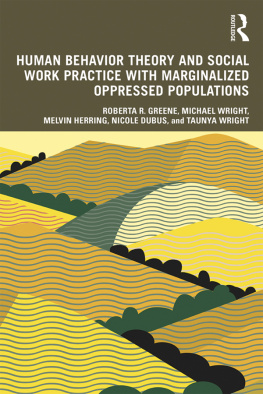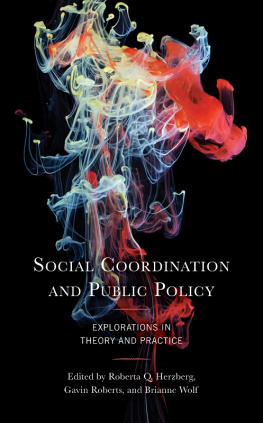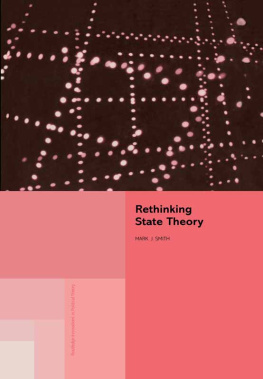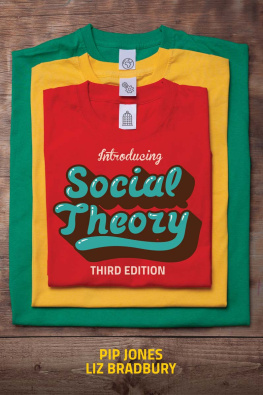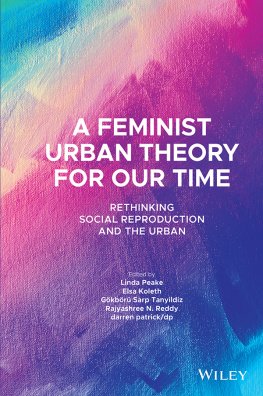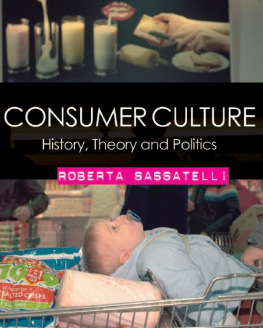Rethinking Contemporary Social Theory
First published 2013 by Paradigm Publishers
Published 2016 by Routledge
2 Park Square, Milton Park, Abingdon, Oxon OX14 4RN
711 Third Avenue, New York, NY 10017, USA
Routledge is an imprint of the Taylor & Francis Group, an informa business
Copyright 2013, Taylor & Francis.
All rights reserved. No part of this book may be reprinted or reproduced or utilised in any form or by any electronic, mechanical, or other means, now known or hereafter invented, including photocopying and recording, or in any information storage or retrieval system, without permission in writing from the publishers.
Notice:
Product or corporate names may be trademarks or registered trademarks, and are used only for identification and explanation without intent to infringe.
Library of Congress Cataloging-in-Publication Data
Garner, Roberta.
Rethinking contemporary social theory / Roberta Garner, Black Hawk Hancock, and Grace
Budrys. 1st Edition.
pages cm
Includes bibliographical references and index.
ISBN 978-1-61205-260-1 (pbk. : alk. paper)
1. Sociology. I. Hancock, Black Hawk, 1971 II. Budrys, Grace, 1943 III. Title.
HM585.G37 2013
301dc23
2013002222
Designed and Typeset in Adobe Garamond by Straight Creek Bookmakers.
ISBN 13: 978-1-61205-259-5 (hbk)
ISBN 13: 978-1-61205-260-1 (pbk)
Contents
, Jos Soltero
, Greg Scott and Julian Thompson
, Tait Runnfeldt Medina and Julie E. Artis
, Grace Budrys
The authors would like to thank the chapter contributorsJulie Artis, Dan Causton, Tait Runnfeldt Medina, Greg Scott, Jose Soltero, and Julian Thompsonfor their vital participation in the project, which made it so much more readable and wide ranging.
Colleagues at DePaul made the book possible, and we thank them for their patience when we trapped them in the hall and shared our thoughts and enthusiasm. These conversations had the marvelous effect of encouraging us to think about the ideas from new perspectives.
The department is fortunate to have a loyal, hardworking, and very alert staff, and we would like to especially thank Jessica Chiarella, Joshua Covell, Valerie Paulson, and Kathleen Tallmadge for being ready to help us with everything, including complicated technological support.
Anonymous reviewers for Paradigm Publishers enabled us to focus the project, and Jeffrey Alexanderwho does not necessarily agree with everything we saywas supportive and encouraging.
Dean Birkenkamp has been our guiding spirit throughoutsupporting us and believing in the value of our inquiry, but also prodding us to improve and sharpen our formulations. Ashley Moore, Jennifer Kelland, Julie Grady, and Jennifer Top made the production process at Paradigm a pleasure.
We only wish that it were possible to thank Mayer N. Zald for his help throughout the project and especially in the writing of , Political Sociology and the Analysis of Collective Action. Mayer was not always convinced by our conclusions, and it was always fun to argue with him; every encounter with Mayer sharpened ones wits and created joy in sociological inquiry. It is largely thanks to him that this chapter has a tone of cooperation and harmony, describing a community that is able to reach out to new ideas while sustaining the scholarship of past decades. Mayer offered suggestions and ideas that made the chapter come alive in fresh ways after he read it in the winter and spring of 2012. Roberta was looking forward with enthusiasm to his reaction to the finished product. She misses him so muchmentor, coauthor, friend.
Part I
Paradigms
We suggest that in recent decades sociology has been deeply permeated by a new paradigm, conflict constructionism, which is characterized by several defining features: attention to the microlevel, analysis of discourses or frames and a renewed interest in signs and language, examination of the construction of difference and dominance, attention to regulation and punishment, interest in cultural hybridity and transculturation, a focus on the body, new approaches to the role of the state, and a consistent conflict perspective.
The paradigm combines elements of both social constructionist theory and conflict theories. It has deep roots in critical theory and more recent links to postmodernism. It is associated with postmodern social thought, although it is less radical and more adaptable to empirical inquiry than postmodernism. The paradigm incorporates elements of Marxist analysis but adjusts them to new global realities and eschews old orthodoxies. In the historical trajectory of many subfields of sociology, conflict constructionism emerged after an intense engagement with conflict theories in the 1970s and early 1980s, which in turn contested the structural functional paradigm of the immediate postwar period. We identify causes for this paradigm shift, which include the contributions of specific individuals, the general intellectual climate, and various social changes, such as globalization and neoliberalism. Conflict constructionism emerged to address puzzles and problems in the conflict paradigms of the 1970s. As a result, old perspectives were reevaluated, presuppositions were rethought, and new tools for social analysis emerged to confront these new conditions.
Conflict constructionism is not a single monolithic paradigm that claims to have solved all puzzles posed by the social world. Rather it is a cluster of perspectives, a loosely connected web of ideas woven together from the work of theorists who have influenced each other without forming a tightly knit community of the like-minded. For example, Erving Goffman and Michel Foucault independently seized on the treatment of the mad as a key to understanding power, regulation, and the construction of deviance. Yet, despite differences in their approaches, the intersections of their ideas yielded new webs of connections across disciplines, and new theoretical framings emerged to speak to multiple audiences.
The subfields of sociology differ markedly in the degree to which they have embraced this new paradigm as a whole, accepted specific elements of it, remained unaffected, or rejected its ideas. In the second part of the book, we examine differences among fields in the ways the new paradigm has been integrated. Sometimes it has come to dominate the field in areas such as the analysis of ethnoracial and gender inequality, culture in the global system, media studies, and the analysis of the self. This type of paradigm shift often reflects massive social change. In other fields, older mainstream theories coexist with the new paradigm, either in harmony or in contention with it. In yet other fields, its impact is limited or containedand largely confined to new exploration of macro/micro linkages. In at least one field, the sociology of health, a striking reconfiguration of the uses of theorynew or oldhas taken place.
Our project is to provide an overview, or map, of the multiple developments that emerged and coalesced into what we have labeled conflict constructionism in order to gain a better sense of our bearings within this new intellectual territory. We do not advocate for conflict constructionism; we only seek to chart it and to provoke discussion of changes in sociology.
We hope to create dialogue among different subfields of sociology, to prod sociologists into reflection on their common assumptions, their differing methods, and ways in which they may speak to each other. Whether conflict constructionism is the new paradigm of sociology or already outdated, whether one agrees with our overview or rejects the summation, we use this opportunity to open further conversations.



